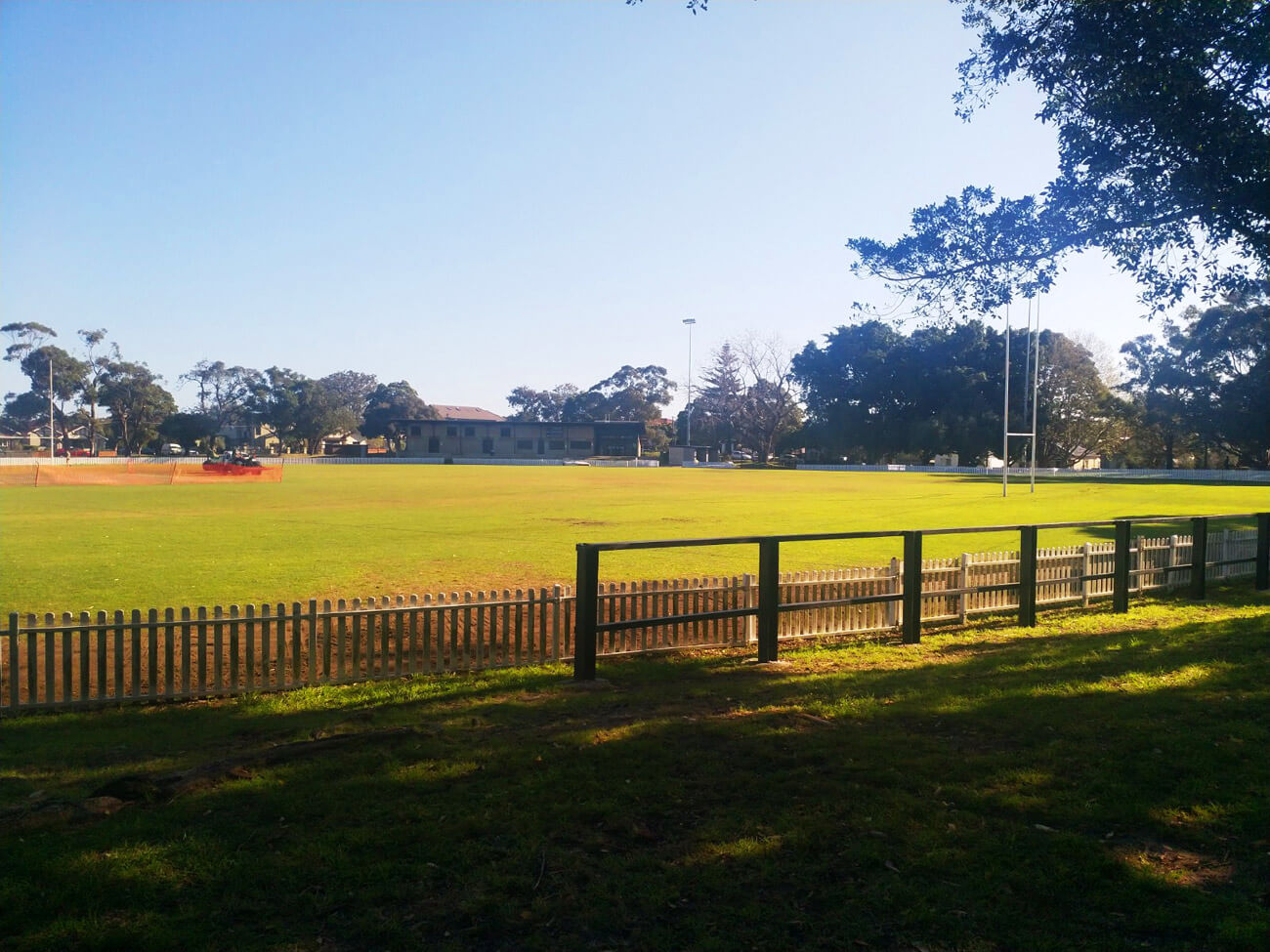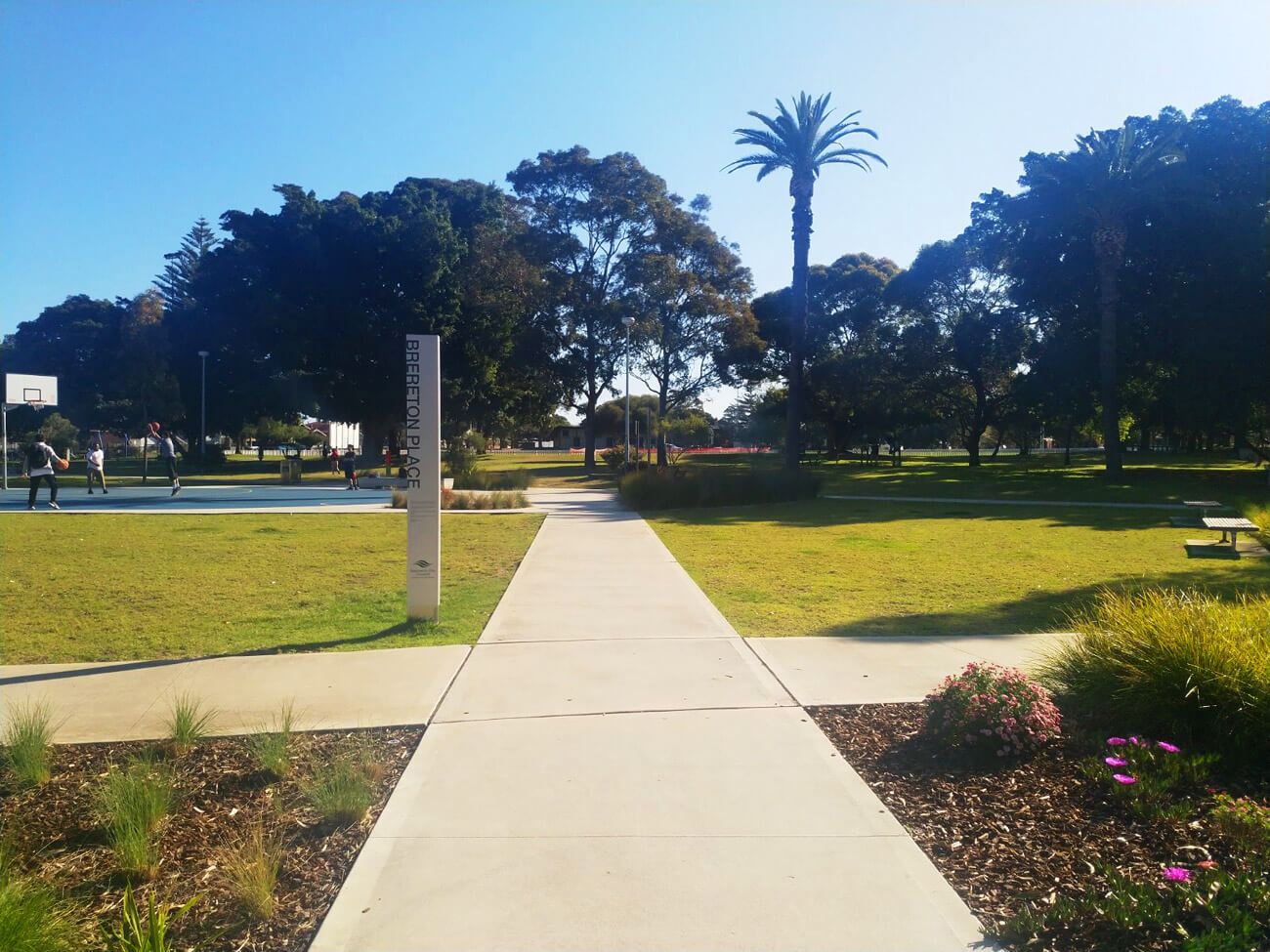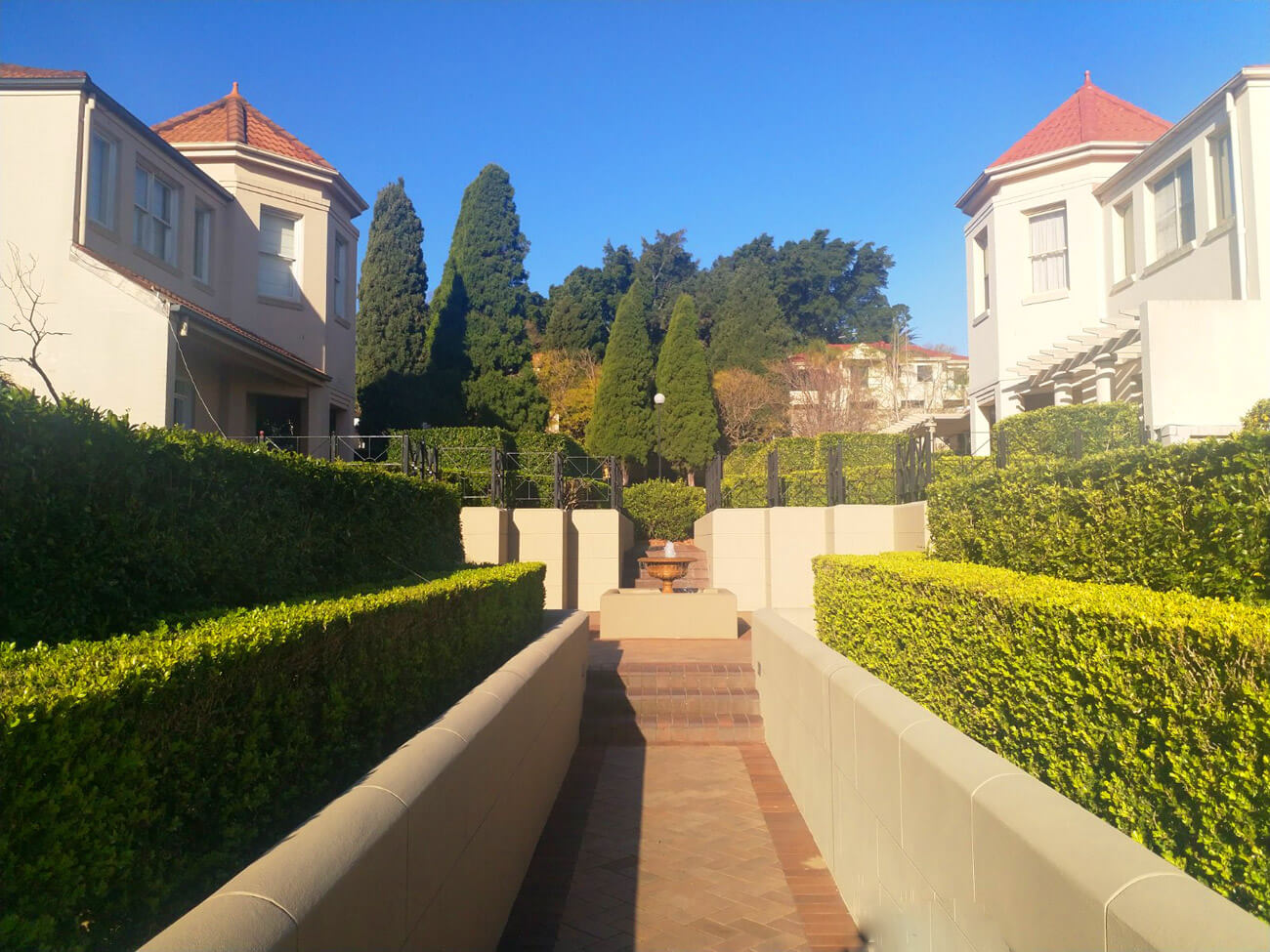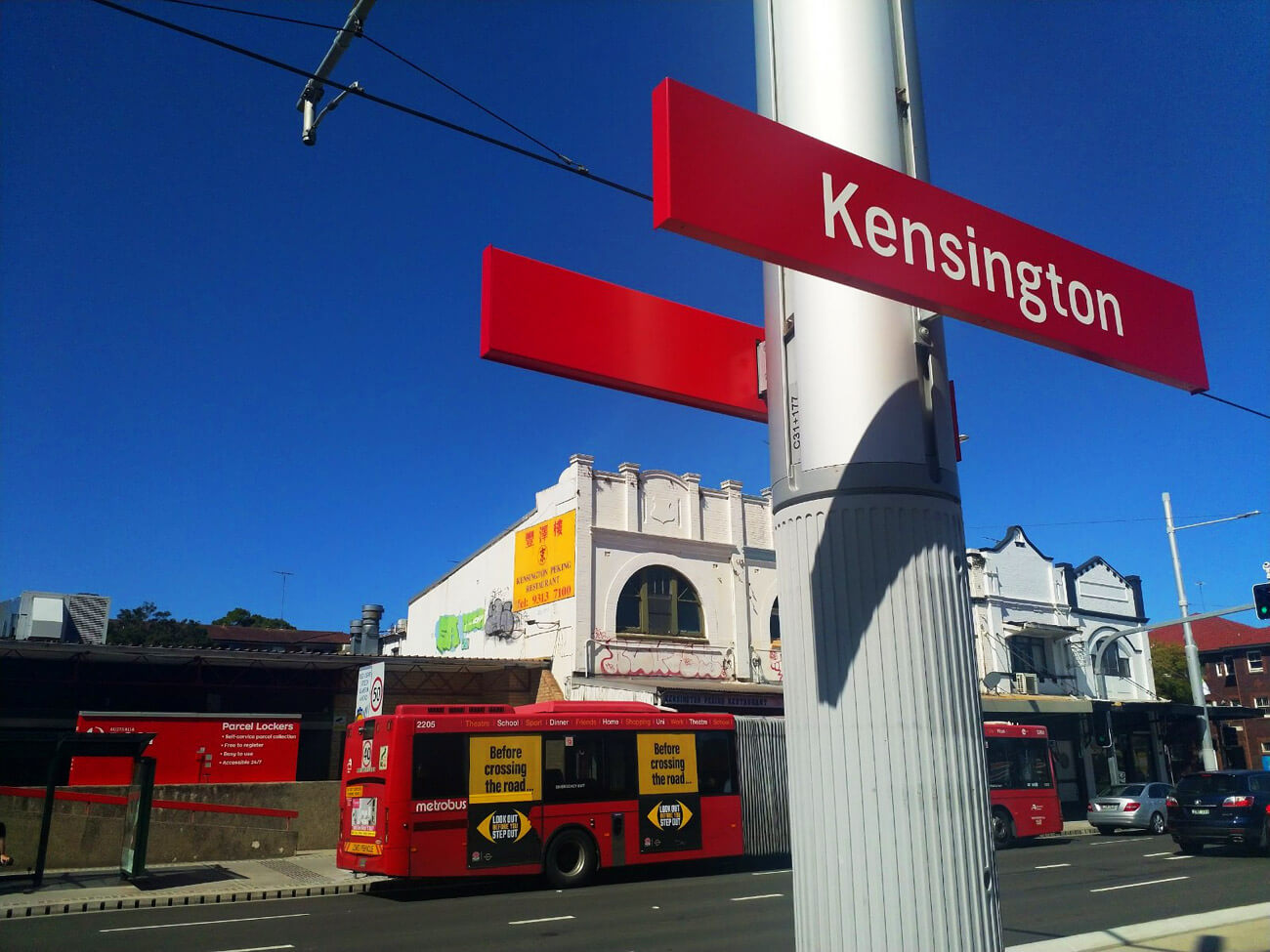Highly varied suburb in which the top and lower ends of town coexist side by side, with easy city access & some grand historic sections to boot.
Summary: An interesting mix of both budget high-density living and the ridiculously high end, Kensington in the “Inner South East” is an extremely diverse suburb that contains fragments of all the varied parts of Sydney both past and present. Squat and ugly mid-rise apartment blocks sit alongside grand Federation homes; slick modern gyms neighbour long-running, old-time local Asian restaurants & abandoned storefronts – all while massive, gorgeous parks and prominent public works lie just a street or two away.
It’s a highly central and well-located suburb that offers numerous demographics a chance at city-adjacent living, with good public transport connectivity and a helping of busy and noisy roads all mixed in. Sprinkle in some absolutely gorgeous pockets of wealthy living, a handful of impressive historic buildings, and an education-oriented chunk of student-heavy society, and you’ve got a recipe for one of the more eclectic suburbs Sydney has to offer. And, one that can often be as cheap – or expensive – as you like.
Key stats
Region: Eastern Suburbs
Population: 15,000
Postcode: 2033
Ethnic Breakdown: Chinese 21.2%, English 14.2%, Australian 12.5%, Irish 7.5%, Scottish 3.9%
Time to CBD (Public Transport): 20 minutes
Time to CBD (Driving): 15 minutes
Nearest Train Station: Kensington (light rail)
Highlights/attractions: Historic religious buildings, large public parks & amenities
Ideal for: Professionals, university students, retirees, families
Median property prices: House – $2,650,000, Apartment – $850,000
Median rental prices (per week): House – $920; Apartment – $580
Simultaneously youthful and prestigious, green and built up, Kensington to the Sydney CBD’s south-east is an incredibly varied suburb with multiple different “pockets” that each offer entirely different standards of living.
This provides it with a massive level of flexibility for those of different life stages, budget levels (for those content with apartment living), and even entirely different lifestyles while still gaining all the benefits from its highly central position.

This leads to a suburb with a pretty diverse socio-economic mix in which the elite, old-money generation coexists in close proximity to international university students and professional workers, and keeps things varied and interesting if nothing else.
Kensington physically sits in a spot in which the east, west, south, and city itself are all within a reasonable proximity, while a number of massive and significant public amenities also lie right nearby.
As a result, there’s a whole host of things to see and do either within, next to, or within a short trip from Kensington despite the suburb itself being quite small in size.

Perhaps the suburb’s most significant recent change has come courtesy of the addition of the light rail, which now gives Kensington another viable connection through to the city. It’s around a 25 minute tram ride from Kensington through to Town Hall, and while it hasn’t brought with it a massive amount of revitalisation for the area it’s still been a handy necessity.
It certainly helps with transport for residents of all the new-ish higher density developments Kensington has seen in recent years, if nothing else.

It also helped tidy up some road issues with the confusing Nine Ways roundabout being removed, clearing up the situation for drivers a little. Driving into the city from Kensington is direct via its main thoroughfare of Anzac Parade, or by hopping on the M1 (although this area around Zetland and its fellows is often even more prone to congestion).
Anzac Parade also sees a large helping of highly-frequent bus services through to the city, or east to popular spots like Coogee Beach in under 30 minutes. They’re pretty packed during peak hour and can often not stop due to being full, but their sheer quantity means another bus will soon be along in short order.

While there’s no heavy rail, it’s this level of flexibility of options for Kensington that gives you multiple choices of methods for getting to the CBD for work and shopping alike.
Kensington has several semi-major arterial roads running through that can get quite traffic heavy. Stretches like Todman Ave cut right through alongside otherwise-prestigious residential areas and can bring a fair bit of road noise along with them, while the run up through Moore Park isn’t always the smoothest either.

As the main concentration of shopping and retail for Kensington, Anzac Parade is decent although nothing special.
It offers a fairly solid mix of restaurants and dining – mostly Asian cuisines, with some other variations – along with other small-scale retailers and services such as newsagents, convenience stores, and a couple of smaller off-brand supermarkets which cover daily needs.

There’s also an increasing number of empty storefronts and neglected facades, which makes it feel a little more rundown than you’d expect given all the recent modern construction. The kitschy pink facade of Peters of Kensington and its various special wares and gifts makes for another unusual feature in what is again a pretty random strip of the city.

While these everyday amenities are adequate, it’s Kensington’s proximity to Sydney’s “Entertainment Quarter” that helps set it apart. The suburb simply “feels” important, with multiple major landmarks and public works directly adjacent and visible.
Royal Randwick Racecourse is the city’s premier horseracing & events club; Centennial Park is the biggest and one of the best public parklands in eastern Sydney; and focal points for major events like the SCG and Allianz Stadium are literally “just down the road”.

Add in Moore Park, the Australian Golf Club and Kensington’s own solid blend of smaller ovals, parks and gardens, and you’ve got a suburb in which it’s easier to simply feel a part of meaningful Sydney life from day to day for those willing to take advantage of it.
And that daily life in Kensington can vary quite a bit, depending on which side or quadrant of the suburb you’re in. On the eastern side and fanning out from its station, Kensington is home to a highly varied and inconsistent streetscape with a scattering of modern and semi-modern low and mid-rise apartment blocks which have been (often awkwardly) added in alongside its federation homes.

This leads to a scenario with often-ugly, brutal and function-over-form high-density apartments clash with prestigious older federation builds propped up on hillside and trying to coexist.
There certainly is plenty of apartment stock both big and small, old and new, which provides a range of fairly affordable living for renters this close to the city and all its highlights.

Many of its freestanding homes in this area are on narrow-ish blocks but which run back a decent stretch, providing a deceptive amount of living space. Many of these also lack off-street parking, owing to historic builds from during a time in which both garages and Sydney’s current traffic levels were not as much of a “thing”.
A fair helping of the older homes in this area are not as well-maintained versus those in other high-end suburbs (or even the other side of Kensington itself); the difference between those which have received a little maintenance and those that haven’t is drastic. Elements of construction also add a layer of noise and disruption to its otherwise historic leanings as well.

It’s not until you start to head west where some of Kensington’s heritage protections kick in where things soon pick up at an impressive rate.
Typically, the further west you head in Kensington, the streetscape becomes either a bit more modern with examples of double-story houses with garages, or more historic single-level homes that have been well kept-up.

There’s a high level of house pride around areas like Mooramie Ave and beyond, culminating in a handful of utter mansions adorning the hillside as Kensington begins to slope uphill.

Historic manor-style homes with their own lifts/elevators, multiple separate entrances to the property, and streetside gates to help keep the riff-raff out are how the high-end residents of Kensington roll.

This pocket of Kensington is also home to a cluster of gorgeous historic religious buildings that are lovely examples of heritage architecture.
The Sacred Heart Monastery which sits atop the hill and dates back to the late 1800’s is the primary attraction, but its collection of churches and colleges surrounding round out the cool historic aspect here.

In terms of greenery, Kensington is solid although much of the credit has to go to the neighbouring big parks and gardens which “technically” lie outside of the suburb’s borders.
Tree cover in its streets ranges from non-existent in the central hub to “good” and “very good” in its back roads, while there are multiple mid-to-small parks and reserves dotted throughout its streets for kids/playgrounds, sports and fitness, and simply enjoying the shade.

Kokoda Memorial Park is small-ish but kid and dog-friendly, for example, while Kensington Oval is a nice, big green space ideal for sports such as basketball and equipped with playground and gym equipment as well.
Add in the ability to walk to the bigger parks outside, and it scores high marks for those with pets that helps make up for some of the apartment living on more limited budgets.

One of the most unique however is Raleigh Park – a manicured and sculpted green area attached to an estate development of the same name.
It’s highly exclusive – the result of a joint project between Westfield and Mirvac during the 1990s – and lead to a prestigious and pretty development featuring bubbling fountains, perfectly-maintained hedges and flower-draped grassed areas and gardens. Your standard, run-of-the-mill “complex of townhouses”, this is not.

Outside of these residential areas, much of Kensington is taken up by the various campuses and buildings of the University of NSW and student and other high-density accommodation to support it all.

The UNSW complex is massive and something of a “mini-suburb” of its own, with multiple little restaurants and cafes, bubble tea houses, public green spaces, an IGA and more in addition to its classrooms and lecture halls.

It’s become massively popular with international students as a result, with not only the uni but other education offerings such as various research institutes and the National Institute of Dramatic Art (NIDA) all centralised here.
Despite the strong university demographic, Kensington doesn’t have too much in the way of entertainment or nightlife within its own borders – it’s more of a launchpad for going out in the city or Eastern Suburbs of an evening.
Outside of the Doncaster Hotel which offers a nice environment and upstairs drinking area, Kensington doesn’t have much going on other than its strip of restaurants.

For families, Kensington fares quite well in both the education and safety departments.
There are multiple choices for private/public, and denominational/non-denominational schools both within Kensington and highly prestigious options in the likes of Waverley, Randwick and more not far away. Its multiple parks almost all come equipped with at least a minimal amount of playground equipment, too.

Crime-wise, Kensington ranks slightly above average for Greater Sydney, clocking in at 0.09% on a per capita basis. That’s not amazing, but it’s still on the safer side with most of its residential back streets largely safe.
Price-wise as a place to live, Kensington again varies greatly given there’s such a wide gap between its many clusters of apartment blocks versus its mostly high-end freestanding homes.
Even within its apartment range – which contains everything from hastily-constructed modern mass blocks to rock-solid historic red-brick blocks of 8-ish units and simple older apartments – the price you’ll have to spend can vary wildly.

For those looking for a freestanding home, Kensington is highly pricey. At time of writing, the median buy price for a house overs around the $2.6 million mark, although smaller and 3-bedroom offerings sometimes become available and can be had for under the $2 million range.
“Daily life in Kensington can vary quite a bit, depending on which side or quadrant of the suburb you’re in.”
Its unit prices are otherwise all over the shop, with a median of $850,000 but a huge portion of them clocking in well north of the $1 million park – especially when you add in a 3rd bedroom.
For renters, around $550 per week can nab you a solid if unspectacular 2 bedroom apartment, with plenty of older stock available for even less.
The Verdict
Kensington’s mix of versatility and pure location can make for a highly suitable suburb for a whole range of people who have some sort of work or study to conduct either in or close to the Sydney CBD. Being surrounded by so many desirable spots both natural and man-made means there’s nearly always something to do or going on right nearby, and its student-friendly nature gives it a buzz that offsets its array of stuffier, high-end and wealthy residential areas quite well.
While the main amenities of Kensington aren’t amazing, its proximity to everything else makes up for this, and its light rail addition has made other parts of the city even more accessible from here as a base than before.
It’s a bit of a juxtaposition where the old and new of Sydney collide – sometimes not in the smoothest fashion – and anything outside of apartment living comes with a prohibitively-high pricetag. Thus the main benefit from living in a spot like Kensington comes for those who will actually go out and take advantage of the surrounding offerings on a regular basis; if you’re not going to utilise the major parks, attend events, head to the beach or in to the city, etc., you can live/buy in plenty of other parts of Sydney for a markedly cheaper price.
For students of UNSW Kensington is an obvious choice, with a communal atmosphere and plenty of student accommodation available courtesy of its heavy dose of apartments. Likewise for workers – the short-ish drive into the city or other employment hubs like Alexandria is convenient as well.
Cashed-up older residents, buyers or retirees who don’t want to head somewhere completely away from the action will likewise find a lot to like in its higher-end homes, while families with cash to spare can take advantage of multiple high-level schools and good public spaces.
If you can afford the price of admission or are content to rent an apartment – and don’t mind dealing with the continual array of students about (or are one yourself) – you could do a lot worse than Kensington. This is a “what you make of it” suburb in full effect that’s got a few flaws, but plenty to like.








